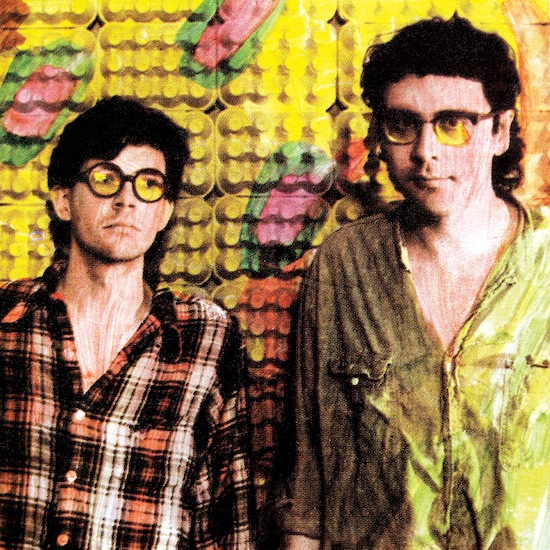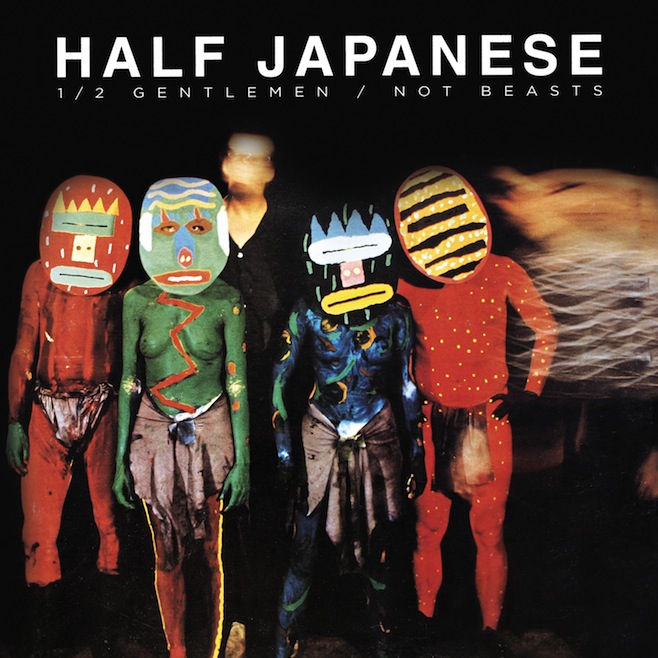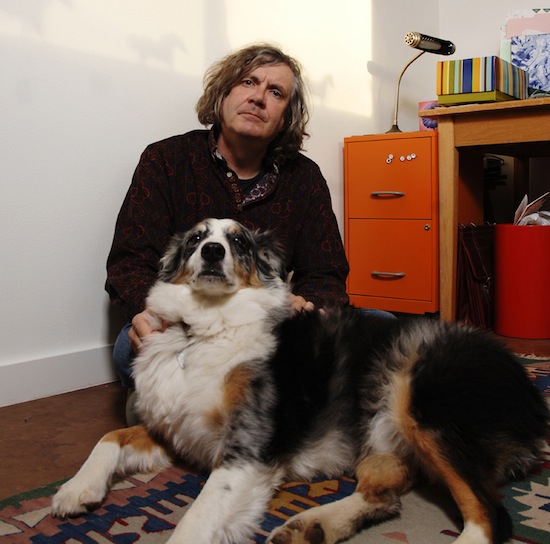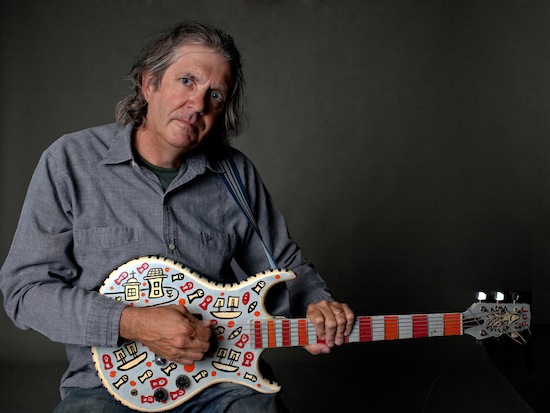Anyone familiar with Brighton’s bastion of local news, The Argus, and their catalogue of outré headlines (see: ‘Mystery Of Restaurant’s Exploding Tea Towels’, ‘Giant Stiletto Found On Beach’, and ‘Postman Beaten By Lavender Bush’) may find an affinity with the 1998 collaborative album of Jad Fair and Yo La Tengo, Strange But True.
‘Texas Man Abducted By Aliens For Outer Space Joy Ride’, ‘Retired Grocer Constructs Tiny Mount Rushmore Entirely of Cheese’, and ‘Dedicated Thespian Has Teeth Pulled to Play Newborn Baby In High School Play’ are just some of the attention-grabbing song titles on an album which showcases the bizarre bent of regional journalism and simultaneously pays heed to the hair-brained humour of one of indie’s most riveting insurgents.
The album – rough-hewn, scrappily melodic guitar-noise outbursts – is a mere drop in the ocean of an artist’s repertoire which stretches over four decades and which consists of eleven solo albums, numerous collaborations, including Daniel Johnston (It’s Spooky, 50 Skidillion Watts, 1989 and The Lucky Sperms’ Somewhat Humorous, Jagjaguwar, 2001), The Pastels (This Could Be The Night EP of 1991, and No.2 EP of 1992, both on Paperhouse) and Teenage Fanclub (Words of Wisdom and Hope, Domino, 2002) – and of course, the trailblazing, lo-fi rock & roll punk of Half Japanese; the band Fair started with his brother David in his Michigan bedroom in 1974.
For a genuine musical rebel, Fair bucks the trend of fog-horned soap-boxing with his reed-voiced timidity. His disregard for traditional chord structures and replacement with shambolic, experimental and primitive guitar playing laid a vital blueprint for the 90s lo-fi crusaders who piggybacked his ride. Half Japanese’s seminal debut Half Gentlemen/Not Beasts is a triumph of home recording and one which secured the band’s cult status, it’s also allegedly the only triple-LP debut in rock history.
Fair is as shy and unassuming as the day is long but beneath this exterior is a knowing eye. He begins our interview with a smart-alec remark – “It’s not that I can’t play the guitar, I’m physically capable of playing the chords and my hands can move into the shape necessary to do that,” – hammering home the point that he can of course strike a chord, but has always chosen not to.
“It’s just that there were so many people making music with chords and following the notes it was too standard for me. My brother and I wanted to do something different; we wanted to have a sound that was more chaotic and more free.”

The band’s first 7-inch EP Calling All Girls (1979) was wracked with sexual inhibition and fear, songs like ‘Dream Date’ and ‘Shy Around Girls’ turning the macho rock star cliché on its head, while serving as a precursor to emo forerunners like Lou Barlow and Mike Kinsella.
Their triple-CD/quadruple-LP debut is a 50-song deep projectile spurt of noisy, heart-on-your-sleeve confessionals which sound cathartic, freeing, and read like diary entries from an anguished adolescent. There’s a stalker-like ode to Patti Smith and all manner of warped reconstructions of the greats. Springsteen’s ‘Tenth Avenue Freeze Out’ is put through the atonal wringer and Dylan’s ‘Tangled Up In Blue’ is razed to the ground and reassembled with sheets of abrasive, shouty, fiery-eyed clatter: “You know, sometimes I don’t get Bob Dylan, he’s trying to tell me this is tangled up in the blues / I wasn’t tangled up in blues, no way, I was tangled up in LOVE!”
In his recent Baker’s Dozen interview for this site, Ira Kaplan celebrated the record. “I had never heard the 7”s so the first thing I heard was this debut triple album and it just was incredible. The most pure record. These two brothers singing their hearts out – I remember hearing this incredible noise and then looking at the lyric sheet and seeing these beautiful heartfelt words that, by definition, didn’t seem to go with the noise they were making but then as soon as you heard it it was perfect and it was like ‘why has nobody thought of this before?!’ Because we’re not Jad and David Fair, that’s why. Remarkable record.” Fair adds further weight to this exultation by informing The Quietus that when the debut came out there were only 1,000 copies made and both Kaplan and YLT’s James McNew bought one each.
This year, Masters of The Great Reissue, Fire Records, are to release the entire Half Japanese discography (14 albums) reliving past moments as well as unearthing hidden gems that have lurked beneath the surface for years, bonus tracks like the track ‘Jad Interview’ – a frenetic, cut ‘n’ pasted stream of consciousness – which appears on the debut reissue.

It all begins with the band’s ‘groundbreaking’ debut (although employing a word of that heft almost feels at odds with a band so entrenched in the nerd-punk sensibility), which was re-released for Record Store Day last month. And along with Charmed Life (1988) and Hot (1995), Fair holds that record up as one of his favourites. He says it’s been “fun” to revisit.
“We had planned to have the reissues come out but were waiting until the right time because if you bring them out too early it doesn’t feel like anything special. We had some releases on Fire during the 80s – 4 or 5 different CDs – so there was a history with them. Half Gentlemen/Not Beasts is an expensive album to re-release. Originally it was three albums now it’s four so it really takes a commitment from the record company to put it out. My brother and I didn’t want to see it come out as anything less than what it originally was.”
In the early days the two brothers shared vocals and drum parts but 1981’s Loud saw the band expand their palette and fill out their sound, adding free jazz sax squeaks and four new members to the mix. The following year they released their horror movie fantasia, Horrible and as time progressed so did their recording ephemera, to an extent. But Fair still extols the virtues of the humble cassette. “There’s definitely something to be said about a tape. The sound of music recorded to tape sounds different than a digital recording, it just has more of a richness to it. That whole saturation really adds to it.”
There’s a palpable sense of ordered chaos to Jad Fair’s work and being. Running parallel to his musical endeavours are his artistic ones: he designed the majority of his band’s album covers and his oft-lauded papercutting, something he started out of sheer tour bus boredom, has been exhibited all over the world, with shows coming up in Tokyo and California. Because the devil makes work for idle hands. “It’s just nice to have something I can do at home. With music, in order for me to make a living, I need to be away from home so it’s great to have art where I can stay at home and make a living out of It. I was doing a lot of travelling with the band; there was so much time spent in the van going show-to-show but reading always gave me a headache. So I would try and do some drawings but my hand wasn’t very steady so I tried papercutting. My hand is very steady with a pair of scissors. It comes very quick to me; but I wouldn’t recommend it in a moving vehicle.”

I ask him about working with Daniel Johnston (“When he falls into a bad mood you just need to talk him out of it, find something that he likes to do, go and get some pizza or something”) and his thoughts on David Shrigley’s Turner Prize nomination (“very nice”), before Fair closes the interview with a statement of gratitude for the man who brought the band to the UK all those years ago: “I would like to say that Half Japanese really owes a debt to John Peel. He gave us our first break because he was playing us long before other people would play us and I am eternally grateful for that.”


